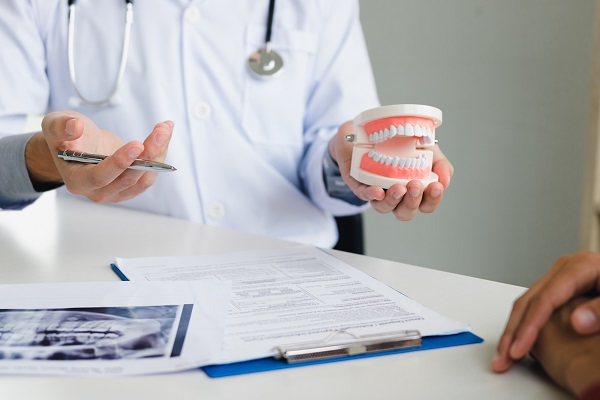What Causes Nighttime Teeth Grinding?

It is often difficult to determine the cause of nighttime teeth grinding. However, it is important to find the root cause and contributing factors of nighttime teeth grinding to treat the issue long-term. While night guards and other forms of treatment may prevent teeth from becoming damaged, the issue may not stop until the root cause is properly addressed.
Common causes of teeth grinding
Nighttime teeth grinding can lead to TMJ disorder and damaged teeth. Due to this, it is important to determine the most common causes and seek treatment promptly if symptoms develop. Four of the more common causes of nighttime teeth grinding are jaw misalignment, crooked teeth, missing teeth and anxiety and sleep disorders such as sleep apnea.
Jaw misalignment
Jaw misalignment increases the risk of nighttime teeth grinding. This is because the bottom and the upper jaws are not even while the mouth is closed, increasing the risk of teeth making contact with one another. Jaw misalignment can be in the form of an underbite, overbite, crossbite or various other forms of malocclusions. A general dentist can treat jaw misalignment through orthodontic treatment. In the meantime, a general dentist may recommend using a night guard to prevent the jaw and teeth from becoming damaged.
Crooked or missing teeth
Crooked teeth can also cause an uneven bite and may increase the risk of teeth grinding. Additionally, missing teeth, especially those that lead to teeth shifting, can increase the risk of nighttime teeth grinding. Therefore, those who have issues with teeth alignment or missing teeth should check for signs of teeth grinding and visit the dentist if there are any concerns. A general dentist may recommend orthodontic treatments such as braces, clear aligners or teeth replacement, along with a night guard to prevent teeth damage.
Stress and anxiety
Stress and anxiety increase the risk of nighttime teeth grinding. Many with bruxism only grind their teeth during the more stressful moments of their life. If this is the case, then lifestyle changes may be enough to treat the underlying concern. With that said, a general dentist may also recommend a night guard to ensure the proper protection of teeth.
Sleep disorders (sleep apnea)
Sleep apnea can cause a stress response that leads to tense jaw muscles, increasing the risk of teeth grinding and clenching. In fact, approximately one in four people with obstructive sleep apnea (OSA) struggles with teeth grinding. Subsequently, it is encouraged for those who are diagnosed with obstructive sleep apnea to seek dental treatment for the sleep apnea to get a better night's sleep and prevent teeth grinding.
Find out how to treat teeth grinding today
Get in touch with our dental team via phone or email today to learn more about the causes and treatment options for nighttime teeth grinding. Teeth grinding can cause severe teeth damage that will require invasive and expensive dental treatment, and it is our goal to help our patients who struggle with nighttime teeth grinding prevent serious symptoms from developing.
Request an appointment here: https://www.sabinodental.com or call Sabino Dental at (520) 308-6711 for an appointment in our Tucson office.
Check out what others are saying about our dental services on Yelp: General Dentist in Tucson, AZ.
Related Posts
The general dentist often uses a dental filling as a restoration procedure for teeth damaged due to decay. Unless the tooth is severely damaged and needs a root canal and a crown, only the tooth filling will be enough. It is better to visit the dentist regularly for checkups, so decay not get too severe.The…
Sleep apnea is a serious condition that causes the airway to become obstructed. Airway obstruction leads to an inability to breathe as oxygen is no longer able to flow. Additionally, sleep apnea can result in a lack of sleep, which may translate to poor work ethic, irritability, and stress. Thankfully, sleep apnea can be addressed, managed,…
Learning how to prevent cavities from a general dentist is smart. General dentists understand everything there is to know about how to take care of your mouth and are a great source of dental information. Whether you think you already have a cavity or want to make a preventive appointment to avoid getting a cavity…
X-rays in general dentistry are useful for catching dental conditions that may not be visible to the eye. General dentists typically require patients to get x-rays at least once a year to ensure that the teeth, gums and jawbone are all strong and healthy.There is a lot of controversy around x-rays in any type of…
